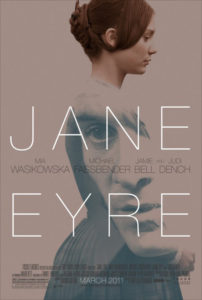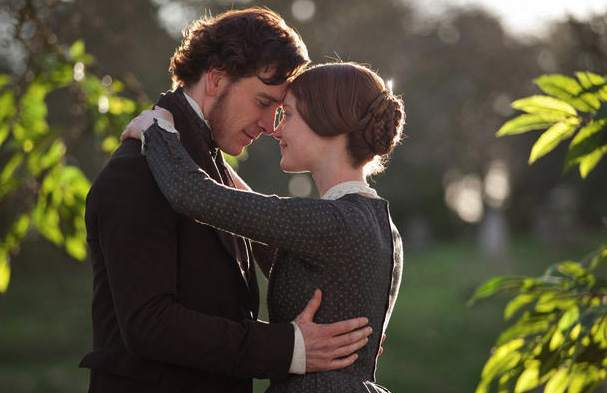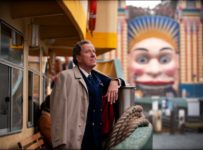 Rising star Mia Wasikowska seemingly came out of nowhere when she emerged fully-formed in Tim Burton’s Alice in Wonderland last year. Yet the Australian actress had already paid her dues on local TV’s All Saints, before gaining roles in the films Suburban Mayhem and Rogue. Although seemingly ideally cast in costume dramas, she has been eclectically cast as a forest wife in Defiance, the daughter of a lesbian couple in Lisa Cholodenko’s indie comedy The Kids Are All Right and That Evening Sun opposite Hal Holbrook. Yet it is to the umpteenth adaptation of Charlotte Brontë’s Jane Eyre that Wasikowska returns for her latest starring role.
Rising star Mia Wasikowska seemingly came out of nowhere when she emerged fully-formed in Tim Burton’s Alice in Wonderland last year. Yet the Australian actress had already paid her dues on local TV’s All Saints, before gaining roles in the films Suburban Mayhem and Rogue. Although seemingly ideally cast in costume dramas, she has been eclectically cast as a forest wife in Defiance, the daughter of a lesbian couple in Lisa Cholodenko’s indie comedy The Kids Are All Right and That Evening Sun opposite Hal Holbrook. Yet it is to the umpteenth adaptation of Charlotte Brontë’s Jane Eyre that Wasikowska returns for her latest starring role.
After being emotionally abused by her aunt and cousins in her ancestral home at Gateshead, a young Jane Eyre (Amelia Clarkson, The Sarah Jane Adventures) is treated as a servant, despite her uncle’s dying wishes. Sent to a charity school, she suffers further torment at the hands of a vindictive school system. After eight years, the adult Jane (Wasikowska) leaves the school and advertises herself as a governess, where she meets the dashing Mr. Rochester (Michael Fassbender, X-Men: First Class). Falling for him, despite his impending marriage, Rochester’s feelings for Jane grow – but the course of true love was never meant to run straight.
With at least a score of film adaptations already gracing the silver screen, and half as many again produced for television, it was doubtful from the beginning as to whether director Cary Fukunaga (Sin Nombre) could bring anything original to the tale. Stripping much of the gothic horror from the novel, including most of the wonderful Red Room sequence or any vision of her dead uncle, this abbreviated version of the Brontë saga relies heavily on the casting of the two leads. Wasikowska has grown quite adept at looking pale and outraged at societal norms, a virtual transplant of her Alice in Wonderland role and Michael Fassbender is quickly being groomed as the new Colin Firth (with this being his Mr. Darcy role). His capable performance as Rochester may make a certain demographic within the audience collectively heave their bosoms and swoon with delight, and the resulting light-headedness that results from being Fassbendered may cause one to overlook the otherwise flat and lifeless interpretation of a classic novel. This is not to diminish either performance, for they are both noteworthy, but screenwriter Moira Buffini (Tamara Drewe) doesn’t extend the story beyond the superficial.
Co-produced by BBC Films, Jane Eyre does little to distinguish itself from previous televised efforts, and Adriano Goldman’s (Conviction) unspectacular photography betrays his TV origins with a look that does not demand the large format screen. Even the presence of Judi Dench, and the seemingly ubiquitous Sally Hawkins, serves to remind us of how good costume drama can be when it hits closer to the mark than this sub-par effort. While new adaptations of the classic novels is inevitable every few years, a new take is demanded on them to ensure their vitality for the ages, especially for cinema audiences. Parody mashups such as Pride and Prejudice and Zombies or Android Karenina may aim to lampoon the source novels, but they manage to remain faithful to the source while providing a fresh examination of their core themes. There may be another great adaptation of the classic Brontë novel to come, but this isn’t it.
[stextbox id=”custom” caption=”The Reel Bits”]A flat and often unemotional retelling of a well-worn story, with a summary version of the tale that is often lifeless, unintentionally funny and tedious at best.[/stextbox]
Jane Eyre is released in Australia on 11 August 2011 from Universal.
The Reel Bits is the cinema arm of DVD Bits. Richard can be found on Twitter @DVDBits. The Reel Bits is also @The_ReelBits




